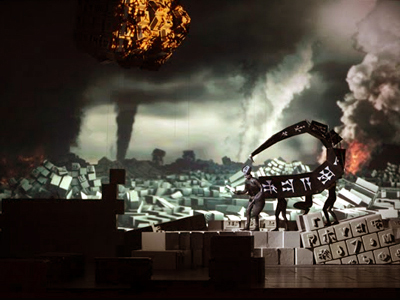
By ANDREW POWELL
Published: November 23, 2012
MUNICH — Scorpion-Man prowls the rubble of an unnamed flattened city at the start of Babylon, Jörg Widmann’s new opera, wailing as he moves. We should care.
Seven scenes, a Hanging Garden interlude, and three costly theater hours later, he is back, doing his thing over the same debris, also multiplying himself, and alas we have not cared or even learned what he represents. Perhaps he is us sad cityites, predatory and detached from our souls.
Widmann’s librettist for this Bavarian State Opera commission (heard and seen Oct. 31) is the post-humanist philosopher Peter Sloterdijk, whose worries, intra-urban and intra-galactic, drive Babylon in one big circle against the backdrop of the 6th-century-BC Jewish exile.
Sloterdijk’s narrative feebly pivots on a love-interest, in the persons of exile Tammu and local priestess Inanna. The character Soul is catalyst in a progression of these two that ends, before the circle has closed, in a concordance of Heaven and Earth (cue sweet music).
Along the way, Tammu gets drugged, laid, sacrificed, resurrected, and flown away with his gal in a spaceship. After administering the drug and enjoying her man, Inanna’s one job is to descend post-sacrifice into the Underworld and retrieve him, being sure not to lose sight of him as they make their way out together.
If this suggests a too-rich stew of Isolde or Norma and Euridice with Tamino, it is. But we are in Babylon, and your bowl arrives as the Euphrates overflows, the New Year rings in at the Tower of Babel, and Ezekiel dictates the Word of God, not to list the antics of seven Sloterdijk planets and fourteen Poulenc-ish sex organs.
Born here in 1973 and locally esteemed, Widmann as composer is much identified with Wolfgang Rihm, one among several teachers and influences. He is, besides, a bold and expressive clarinetist: a 2012 Salzburg Festival performance of Bartók’s Contrasts with Alexander Janiczek and András Schiff all but vaulted off the Mozarteum’s platform, and a 2011 Munich partnership with the Arcanto Quartet found rare vigor as well as cozy plushness in Brahms’s Clarinet Quintet.
The Nabucco-era subject had taken the composer’s fancy long ago. Ideas sprouted. A raucous Bavarian-Babylonian March emerged as orchestral fruit last year, bridging the millennia if not exactly the cultures. At some point came the link with Sloterdijk and the decision to plough forth with an opera, Widmann’s sixth piece for music-theater.
Undaunted by the librettist’s loony layers, Widmann supplies for Babylon music of chips and shards and sporadic mini-blocks. 160 minutes of it.
He savors direct quotes, splintered just past the point of identifiability. These he takes from jazz, operetta, lute song, Baroque dance, cabaret, Hollywood, symphonies, band repertory. He crafts brief, pleasingly original blocks of sound in various forms — brass swells, percussive glitter, choral refrains, woodwind banter — deploying them to varying effect. He is a gifted colorist, writing with virtuosity for all sections of the orchestra, in this case a large one, heavy on low winds and percussion.
Vocally the writing is less fluent, less confident. Abrupt ascents are a peculiarity. The tessitura of all three principal roles — Inanna, the Soul and Tammu — lies coincidentally high for each of the voice types (two sopranos and a tenor). Vocal lines are often aborted, mid-flight, again producing small blocks.
Widmann’s chipboard elements are arrayed in rapid indigestible sequences some of the time (Scene III’s orgy). Elsewhere, thin writing overstays its welcome or fails to develop in sync with the cosmic-Biblical scheme (Scene V) — the “prolix musical treatment” George Loomis noted in his review.
Enter Carlus Padrissa, the busy Spaniard known for constant stage movement. Hired to define and motivate the opera’s characters and unite the threads in text and score, Padrissa delivers, well, movement.
The gloomy arthropod’s rubble swiftly morphs into moveable letterpress type: Cuneiform, Katakana, Cyrillic, Hebrew — ah, Babel, the universal translator — to be piled up by mummers, piled down, carried off, brought on. Nearly incessantly. Flown and raised platforms support and transport sundry participants, some of them needed. Projected screen-saver lines depict the restless Waters of Babylon. Moving photographic images reveal holy verse, hell fire, a meteor (or ICBM) crashing to Earth. There is always plenty to watch.
Still, two problems dog Padrissa’s circus-like approach to opera, evident in his 2007–9 Valencia Ring and 2011 Munich Turandot: movement everywhere deprives the action of focus; and physical space required for upstage activities (open wings, as in ballet) deprives the singers of sound boards (in the form of sets) to reflect and project their voices. So it is with Babylon.
In the Turandot — due by chance for Internet streaming in its revival on Sunday (Nov. 25), here, and significant for the textual decision to end where Puccini ended — the voice-projection problem is addressed by having much of the principal singing occur drably near the stage apron.
In Babylon it is addressed with amplification*, subtly on the whole, though on Oct. 31 individual vocal lines resounded unnaturally at several moments.
Generalmusikdirektor Kent Nagano brought to the new opera his dual virtues of judicious tempos and attention to balances. The orchestra played compliantly, David Schultheiß working as poised and able concertmaster. Anna Prohaska and Claron McFadden coped deftly with the vocal stratosphere as Inanna and the Soul. Gabriele Schnaut brought rolling majesty to the Euphrates personified. Countertenor Kai Wessel exuded glum fortitude as Scorpion-Man. Jussi Myllys, the Tammu, relished having more to do than in his numerous recent Jaquinos, serving Widmann’s music earnestly. Willard White, as Priest-King and as Death, growled and boomed with his customary expertise.
When final blackness came, the polite Bavarian audience registered its ennui not with boos but with the barest, most ephemeral applause. Reconciling Heaven and Earth had proven easier than reaching across the proscenium.
[*Bavarian State Opera in a Nov. 26 message noted that “amplification was used for some parts” of the opera and that Widmann “actually marked the use of amplification for the scenes with heavy orchestral instrumentation in the score.”]
Photo © Wilfried Hösl
Related posts:
Levit Plays Elmau
Petrenko Hosts Petrenko
Manon, Let’s Go
Tonhalle Lights Up the Beyond
Mélisande as Hotel Clerk

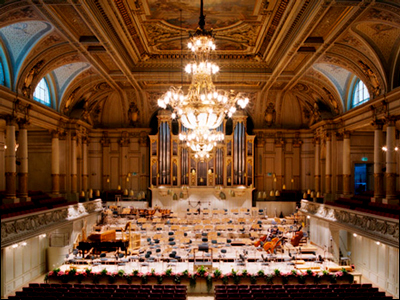

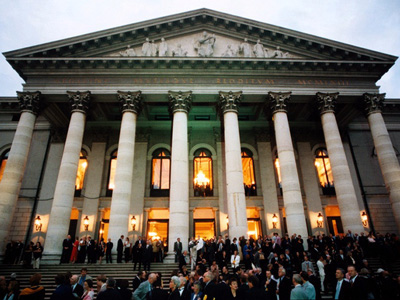
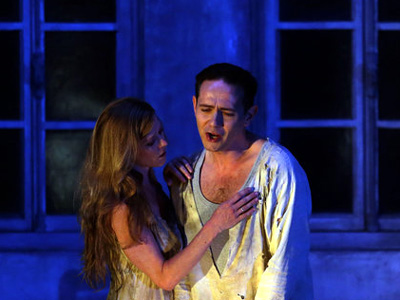
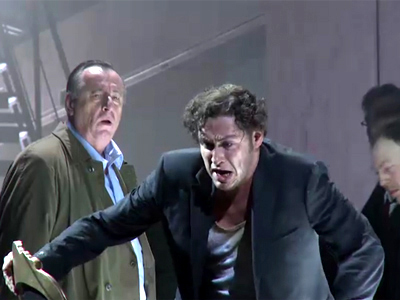

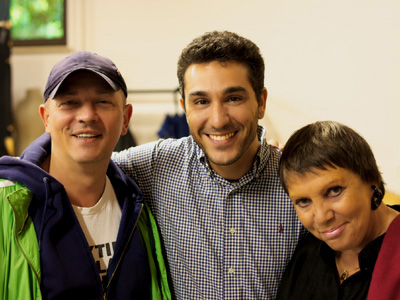
Petrenko to Extend in Munich
Friday, July 24th, 2015By ANDREW POWELL
Published: July 24, 2015
MUNICH — Bavarian State Opera has confirmed by phone it will announce a contract extension for Kirill Petrenko before the start of next season, in September. With the month of August being a house holiday, the news could come as early as next week when the company’s annual Munich Opera Festival winds down.
Petrenko, 43, became Generalmusikdirektor less than two years ago but has quickly earned respect with his musical dedication, technical gifts and impassioned manner. His present contract expires in August 2018.
Although talks to retain the Russian-Austrian’s services longer into the future have been underway for some time, as company Intendant Nikolaus Bachler noted last month, the announcement will be coming at an awkward juncture given Petrenko’s June 21 acceptance of a surprise invitation to serve as Chefdirigent of the Berlin Philharmonic, albeit with no firm start date.
His move from Carlos Kleiber’s orchestra to Herbert von Karajan’s will likely mean a briefer extension than would otherwise have been the case and a phasing in of Berlin commitments that works around his long-range Munich opera plans. Hopes are dashed anyway of a full Petrenko “era” at Bavarian State Opera like that of Wolfgang Sawallisch, who led the company for twenty-one years.
The new contract will have three parties: the conductor, who is currently preparing cycles of Der Ring des Nibelungen in Bayreuth; Bachler; and Ludwig Spaenle, Bavaria’s Kultusminister.
A perfectionist if ever there was one, Petrenko operates with specific capacity. Strain takes its toll. In 2007 he suffered “exhaustion,” leading to cancellations. He pulled out of a 2011 Fidelio in London due to back problems. Last December he was “indisposed” for his fourth planned Berlin Philharmonic program, and in March he cited strenuousness of assignment as a reason for withdrawing from the Bayreuth Festival in 2016 and 2017. He has just begun to relax in the saddle with the Bavarian State Orchestra.
What separates him somewhat from his nominal peers is his not being good at everything. Instead he brings ideas and expressive depth to scores he identifies with. Mussorgsky and Strauss and Berg are strengths.
Petrenko debuted at Bavarian State Opera with Pikovaya dama in October 2003. He returned five seasons later for a new Jenůfa, receiving personal acclaim. In July 2010 it was leaked that Kent Nagano’s contract as GMD would not be renewed, and immediately, before Nagano “quit,” Petrenko’s and Fabio Luisi’s names were publicly mooted. Bachler’s choice, Petrenko won out on Oct. 5, 2010 (to start Sept. 1, 2013). Luisi withdrew piecemeal from several later staged-opera commitments with the company.
As GMD, Petrenko has led premieres of Die Frau ohne Schatten, La clemenza di Tito, Die Soldaten, Lucia di Lammermoor and Lulu as well as a revival of Wagner’s Ring in Andreas Kriegenburg’s hopeless realization (Siegfried’s encounter with Brünnhilde reduced to bedroom farce).
Next season his commitments here include South Pole (Miroslav Srnka), a new Die Meistersinger von Nürnberg and, not least, Die Fledermaus. The Bavarian State Orchestra’s six yearly concert programs, or Akademiekonzerte, will feature Petrenko in music of Mendelssohn, Tchaikovsky, Strauss, Mahler, Elgar and Sibelius.
Photo © Wilfried Hösl
Related posts:
Bretz’s Dutchman, Alas Miked
Petrenko Hosts Petrenko
Berlin’s Dark Horse
Mélisande as Hotel Clerk
Flitting Thru Prokofiev
Tags:Bavarian State Opera, Bavarian State Orchestra, Bayerische Staatsoper, Bayerisches Staatsorchester, Berlin Philharmonic, Commentary, Kent Nagano, Kirill Petrenko, Ludwig Spaenle, Luisi, München, Munich, News, Nikolaus Bachler, Wolfgang Sawallisch
Posted in Munich Times | Comments Closed